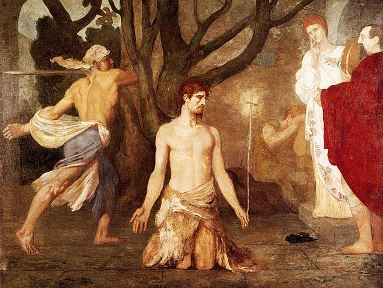John the Baptist and the Prophetic Spirit of Pentecost
9 This is underscored clearly in Mark’s gospel, who equates preaching the gospel with the message of the Kingdom. As with Luke, Mark mentions that John appeared in the wilderness preaching “a baptism of repentance for the forgiveness of sins” (1:4). Mark records the first words of Jesus as, “The time is fulfilled, and the kingdom of God is at hand; repent and believe in the gospel” (1:14). Then when the Twelve are commissioned and sent out in pairs to preach the Gospel throughout Galilee, Mark summarizes with, “And they went out and preached that men should repent” (6:12). [Emphasis mine] In view of the above, it seems obvious that modern preachers who avoid raising the issue of sin and repentance, in an attempt to gain a hearing for the gospel by the unchurched, are tampering with the integrity of the Gospel itself. Without mentioning repentance from sin there is no gospel!

The Beheading of St John the Baptist by Puvis de Chavannes, Pierre-Cécile, c. 1869.
Image: Wikimedia Commons
10 In this John is not unlike any number of his OT prophetic predecessors who warned Israel against oppressing the poor and called her to show God’s compassion by remembering the poor. See Lv 19:15; Dt 24:14-18; Isa 3:13-15; Jer 2:34; 5:4, 28; Ez 16:49; 18:12-17; Dn 4:27; Amos 4:1; 5:11-12; Zech 7:9-10; Cf. Prv 17:5; 19:7, 17; 22:2, 9, 16, 22; 28:3, 6, 8, 11, 27; Ps 72:12-13 et al.
11 This has to do with what I call the “incarnational purpose” of the Church. As Israel was to be “light unto the Gentiles” (Is 42:6; 49:6; cf. Lk 2:32 ), the Church of Jesus Christ is make visible the redemptive character of God seen in His salvation. Note that in Lev. 19 God defines the command to covenantal holiness in ethical terms. Broadly speaking it is the command to love one’s neighbor (vv. 18, 34). Among the various commands the compassionate concern for the poor features prominently (vv. 9-10, 15, 34).
12 What is interesting is that Paul begins chapter eight by commending the Macedonians for making known the “grace of God” by sacrificially giving to this offering despite their own “deep poverty” (2 Cor 8:1-2).
13 The author could not resist the pun given the “fatal” consequences of John’s prophetic denunciation of Herod Antipas.
14 Note Matthew 14:4 and his use of the imperfect tense, which in context is probably progressive (“had been saying”) or iterative (kept saying”). John’s denouncement: “It is not lawful for you to have her.”
15 Rome as the occupying power did not extend the power of execution to the Sanhedrin (See Jn 18:31). Nevertheless, Herod as a client king of Rome was accorded that power.
16 Josephus recounts Herod’s betrayal of his brother (Philip – not the tetrarch), illegal marriage to Herodias, his brother’s wife, and the divorce of his wife, the daughter of the Nabatean king Aretas. See Antiq.18.5.1. Josephus goes on to relate that Aretas responded to this betrayal by making war and defeating Antipas, a defeat the Jews regarded as divine retribution for killing John the Baptist. Antiq.18.5.2.
17 In Mt 23:29-35 Jesus gives his own summary of that prophetic testimony and the supreme price paid to deliver it.
Category: Ministry, Spring 2005


